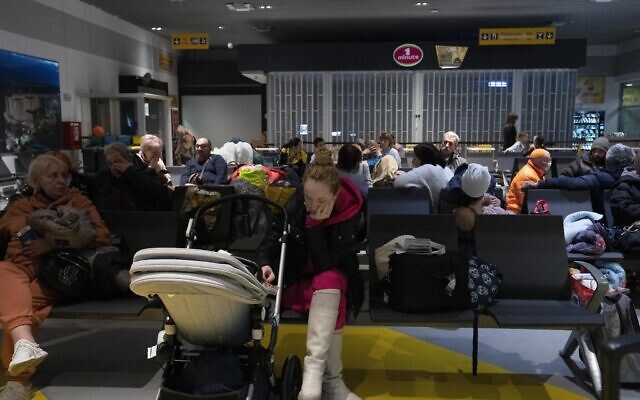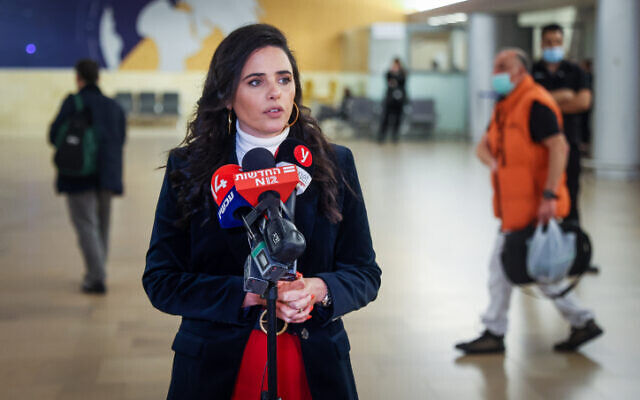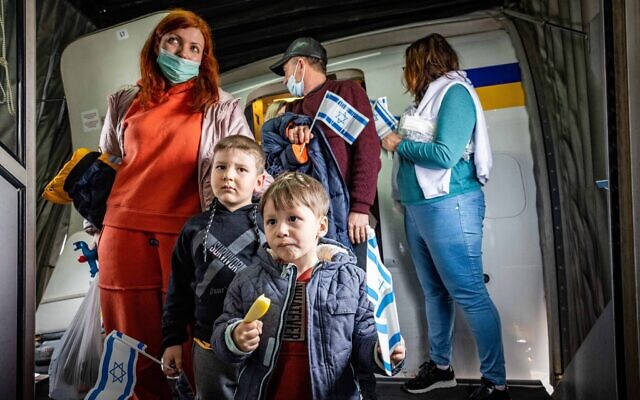Interior Minister Shaked announces new policy exempting refugees with relatives in Israel from entry quota, but says ‘we cannot open our gates to everyone’

Interior Minister Ayelet Shaked announced Sunday that people who are fleeing Ukraine who have relatives in Israel will be exempt from a 25,000-person entry cap placed on those refugees who are not eligible for Israeli citizenship.
The move came amid rising criticism of the government’s refugee policy, from both within and outside the government.
It was not immediately clear how many more refugees the new policy means Israel will now admit.
Diaspora Affairs Minister Nachman Shai, one of numerous members of the governing coalition who have been protesting the entry cap, called the new policy “too little, too late.”
Shaked stated last week that Israel would grant entry to no more than 5,000 Ukrainian refugees — who are not eligible for immigration — from the start of the war, and allow them to remain temporarily in Israel, alongside the approximately 20,000 Ukrainian nationals already in the country when the war began.
Earlier Sunday, reports indicated that the 5,000-person entry cap had already been surpassed. According to statistics published by the Population and Border Authority on Sunday morning, 7,179 Ukrainian nationals have arrived in Israel since Russia invaded Ukraine on February 24, and 221 were refused entry. The statistics included those who are immigrating and who are eligible to do so under the Law of Return, which grants citizenship to anyone with one Jewish grandparent.
The acceptance of a greater number of Ukrainian refugees into Israel has been hotly debated within the country and within the government over the past week, as outrage has also grown over the treatment of those who have arrived at the airport, some of whom have been detained for many hours.

Visiting Romania on Sunday, Foreign Minister Yair Lapid said that Israel has a moral duty to allow in greater numbers of Ukrainian refugees, no matter their status and castigated the airport procedures. Israel has “a moral obligation to be part of the international effort to help refugees from Ukraine find a warm home and a bed to sleep on. It’s our obligation not only to be good Jews but to be good people,” he said.
“What is unforgivable and unacceptable are the mistakes that were made in dealing with refugees who already arrived in Israel,” he added. “The scenes of an old woman and her daughter sleeping on the floor at Ben Gurion Airport must not be repeated.”
Today, I visited the Siret border crossing. We won’t close our gates & our hearts to people who’ve lost their whole world. We have a moral obligation to be part of the international effort to help refugees from Ukraine find a warm home & a bed to sleep in.
📸: Shlomi Amsalem/GPO pic.twitter.com/0CWjKZDHCX— יאיר לפיד – Yair Lapid🟠 (@yairlapid) March 13, 2022
Finance Minister Avigdor Liberman, himself an immigrant from the former Soviet Union, said Sunday that Israel must allow all Ukrainian refugees arriving in the country to enter. “When the cannons are heard, we must accept all those fleeing whose lives are in danger,” he told the Walla news site. “When the firing stops, we need to stop accepting refugees, but, at the moment, there is mortal danger, people are coming from all sorts of places where battles are being waged… There is no danger they will settle here in order to find a job,” he added. “We need to allow in those who come.”
In announcing the new policy, Shaked said Sunday that, “as the persecuted Jewish people, we understand what refugees are: we also open our hearts and doors to those who are not eligible for citizenship.”
But such a move, she said, “must be done to a limited extent. We cannot open our gates to everyone. It will not happen on my watch.”
Therefore, she said, “there will remain a cap, but — in order to maintain the visa agreement with Ukraine — after meeting with the deputy attorney general this morning, it was decided that relatives would be exempt from the quota.”
Anyone arriving from Ukraine who has a relative living in Israel, and that relative signs a form saying that the refugee will stay with them for a month or two, will be exempt from the quota, Shaked said. It was not immediately clear how close the relationship must be in order to qualify, nor what proof would be required. Most of the Ukrainian refugees arriving in Israel are believed to have family or friends already in the country.
Shaked’s announcement came after a petition was filed in the High Court over the weekend against the interior minister’s earlier policy. The Ukrainian Embassy in Israel backed the petition, which claims that the cap on refugee entries violates international agreements between Israel and Ukraine, as well as international conventions to which Israel is a party.
Prime Minister Naftali Bennett welcomed Shaked’s announcement on Sunday, saying that, while Israel’s primary goal is to help immigrants, “at the same time, the moment we are in requires us to reach out and be a refuge, even if temporary, for people who escaped the war and have relatives here in Israel, who can be their support in this difficult time.”
Shaked early Sunday had doubled down on her policy of maintaining a limit on the number of refugees not eligible for citizenship allowed into the country, saying that “it is possible to do something populist, but I choose to do something right, even if it is not popular.”
She also repeated the claim that Israel must limit the number of non-immigrant Ukrainian refugees it allows entry, in order to be able to absorb the expected wave of new immigrants fleeing the fighting. So far, more than 2,000 new immigrants from Ukraine have arrived in Israel, and more than 7,000 have reached out to the Jewish Agency for Israel to inquire about immigrating.

Diaspora Affairs Minister Shai slammed Shaked’s updated policy.
“No other country has imposed limits on refugees. This framework is still problematic, and we are again restricting the arrival of refugees and making a distinction between those who have family in Israel and those who do not,” Shai said.

“As I have said again and again in recent days, Israel must take a broader and more active role in the humanitarian effort to rescue Ukrainian citizens fleeing the war. This is the ethical and humane act that we must carry out.”
Shai has been consistently critical of Shaked’s policies since Russia invaded Ukraine. Last week, Shaked hit back, accusing Shai of “slandering Israel” in his statements.
Ukrainian Ambassador to Israel Yevgen Korniychuk said on Friday that most Ukrainian refugees were unlikely to want to remain in Israel once the war is ended.
“Israel is not the easiest place to come or the most comfortable place to be,” he told Channel 12 news. “You are one of the most expensive countries in the world. And assuming most of the European countries are providing shelter, food, work permits, education for children — this is what’s going on. So what are you talking about?”
As reported by The Times of Israel
